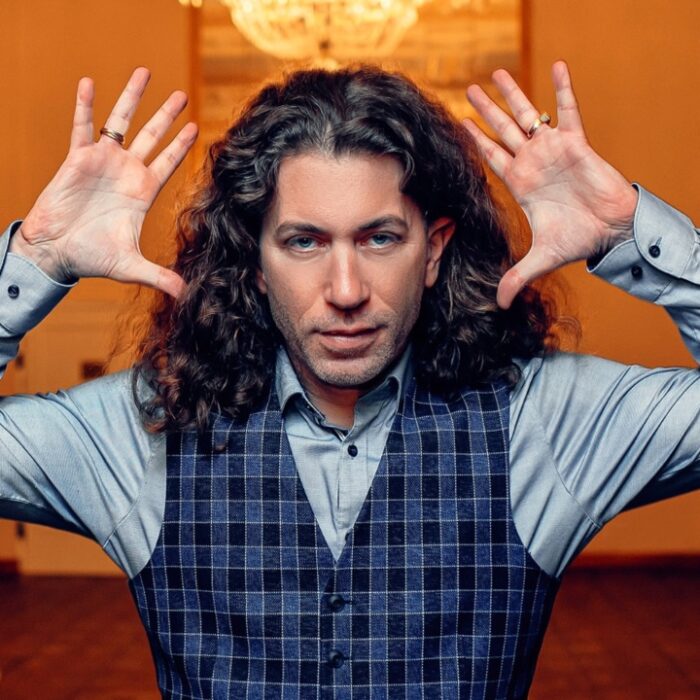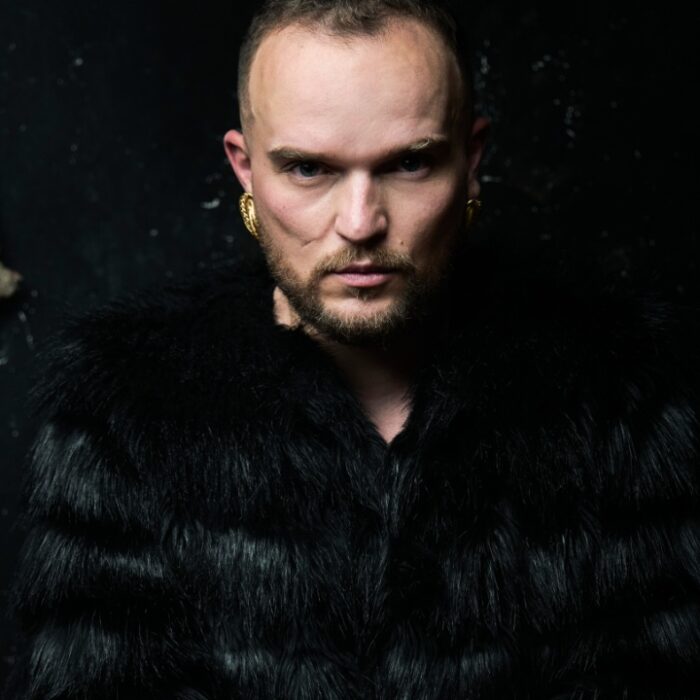
Q & A: Molly Noori Discusses Her Non-Profit ‘The Chronicled Voice’ & Experiences With Chronic Illnesses
By Afton Markay(Photo credit: Anastasia Sistevaris)
Unable to perform this past year due to a chronic illness that directly affects her vocal mechanism, mezzo-soprano Molly Noori has turned towards advocating for other singers in a similar position. Through her new non-profit, The Chronicled Voice, Molly has created a safe space for opera singers to talk openly about their frustrations, fears, and ideas for change and visibility.
OW: If you feel comfortable, could you please talk about how your illness has affected your career?
Molly Noori: The backstory is long and complex but the concise version is, about a year ago, as I was polishing my arias and preparing for auditions, I found that my voice just wasn’t working normally and I was experiencing lots of funky symptoms when I sang but, most alarmingly, I felt a lot of pain. Because of these vocal issues, I’ve had to stop performing and significantly cut back my private studio.
The way fibromyalgia affects the voice is through chronic pain, muscle spasms, and tension. There are also studies that suggest the neurological component of fibro is at play. For me there’s an overlap between the fibro and autoimmune diseases that directly impacts my vocal cords and larynx. For me, the autoimmune disease caused rheumatological nodules on my chords and partial paralysis in the left one. To be clear, they’re not the regular nodules that would be more common for a singer to get – these look like bamboo and run up and down the entire cord. So we did a surgery and injected the folds with a steroid, and we waited. There were weeks and weeks where my cords showed no improvement but finally at my last ENT (Otorhinolaryngology) appointment, my cords appeared to be normal again. We still don’t know if this is because of the time between the surgery and the appointment, the steroid injection having a delayed response, or if the autoimmune disease wasn’t manifesting in that part of my body at this time – the affected areas shift around quite a bit and symptoms come and go with flare ups. At my last appointment, I was cleared to sing, which was a huge win although I still feel a bit of peripheral pain in my throat from Fibro and issues with my thyroid, so navigating that (especially emotionally) will be a challenge.
OW: Why did you start The Chronicled Voice?
MN: It was incredibly frustrating and scary to feel like I was alone in my situation for those first couple months after I couldn’t sing. I wasn’t able to get many answers from my doctors so I started messaging other singers trying to figure out if anyone else had fibromyalgia and/or autoimmune disease and how they handled it. Initially, I had a really hard time finding anyone that either fit that description or that were willing to talk about it openly. But I know there’s 29% of people in the world with disabilities and with chronic illness and I know that at least 6% of those people are registered singers with AGMA (American Guild of Musical Artists). So, I started The Chronicled Voice initially as a blog and a safe platform where singers could talk about it either anonymously or openly.
I don’t want any singer to have to go through that feeling of hopelessness and isolation and I also don’t want any singer to feel like they have to hide out of fear because our society has stigmatized disabilities and attached this bizarre ideal that opera singers need to function at a level of perfection all the time.
OW: What has the response been like?
MN: The response has been very positive. So many people began reaching out to me anonymously. Artists that range from amateur singers to directors to YAP administrators to singers with international careers saying how their chronic illness affects them, but that they would never ever actually talk about it because they were so afraid of being judged or not getting hired.
Here are some of the anonymous responses submitted to The Chronicled Voice:
“If a singer with autoimmune issues asks for a very small change to staging to accommodate a disability, please hear them out. We’re not trying to be difficult, we’re trying to give everyone the best show possible.”
“State of being can change in an instant. Be understanding if it does so negatively, because the person it’s effecting is already most likely frustrated that it’s happening with little to no control, possibly embarrassed, and more likely than not, scared to let anyone else know in the first place out of fear of judgement, being ‘othered’, or seen as less than. Most of the industry has no idea just how ableist it truly is, and that needs to change.”
“Please have someone on staff who is familiar with neurodivergency and (c)PTSD in all its myriad manifestations and nurture a tolerant and accommodating rehearsal environment in the rehearsal room, cast and crew culture, and backstage.”
“Incorporate accommodations without needing to be asked. Singers shouldn’t be forced to stand through rehearsals when it’s unnecessary if that’s hard for them. Work wheelchairs into staging/productions without a fuss. You did it for Joyce DiDonato with a broken leg, you can do it for anyone.”
I see there’s a need, so I keep sharing my story and connecting with more singers in a similar position. I decided to make this a nonprofit so we can do something larger and support our community.
OW: Can you identify the root of this problem?
MN: There’s so much stigma around chronic illness. These topics are considered weird and unknown, uncomfortable, and even unprofessional to talk about. There are definitely companies that are inclusive and are aware of the issues. Some companies are inclusive but don’t explicitly post it. Some places say they have inclusive casting practices, but then those practices aren’t the same for lead roles. A lot of it comes down to awareness, education, and, perhaps, if the donors will like it or not.
OW: What can opera companies and agents do to help?
MN: There just has to be an open line of communication. I think it starts with the casting call. The first bit of documentation a singer sees needs to make them feel empowered and safe. It needs to say that this is an inclusive process and will be accommodating and offer a clear way for the singer to communicate their needs.
This dialogue has to remain open throughout the whole process. It would be great if the world were such that we could walk into an audition and say, “Hi, I have _______ and may need _______ accommodation during your production.” And then go on and sing without any judgment or label slapped on us but that’s not how it is. There is so much misinformation and stigma, especially with invisible illness. How do we navigate that communication eloquently and professionally if we are the first ones to make a move, so to speak?
If we walked in and said, “Hi, my name is _______, I’m going to sing ________ and oh yea, I have chronic illness, it’s invisible” most of the people on the panel would perceive that as an excuse- like we are announcing we have a cold and we would be labeled “hard to work with” or “showed up sick” or, even worse, they would assume that we are incapable of doing our jobs because of our disability. Which is just not true. (This is a good place to point out that my specific situation with rheumatoid nodules is not a normal symptom that singers with chronic illness experience and most illnesses do not directly affect the cords).
We have to make sure people know what chronic illness is and make sure the information is laid out clearly. I’ve found people have their own definitions of chronic illness, so if the panel thinks it’s one thing and the director thinks another, there’s no real way to have an open line of communication. Plus, everyone experiences symptoms differently so, we have to educate everyone involved and most importantly we have to listen to the singer.
OW: Are there any organizations you have partnered with or would like to partner with?
MN: I have partnered with a beautiful organization called Our Singing Bodies. They incorporate poetry with other media forms to talk about what singers’ bodies have gone through and how it affects their voice. I’ve chatted with Ted Zimnicki on the podcast “The High Note.” I am also contributing to Anne Slovin’s dissertation, “Sing As You Are: A Disability-Informed Model for Undergraduate Voice Pedagogy Curricula.”
I’m contributing to a NYC art show fundraiser in collaboration with Double U Triple A. The theme is “Resilience.” I will be reading excerpts from some of my writing this past year as well as debuting one of the songs from my album and will be creating a portrait series featuring five singers with chronic illness as well as one large multimedia work that will be auctioned off for the fundraiser. The incredible FERN New York, a fashion designer who also has autoimmune disease, will be designing my wardrobe which will be an extension of my multimedia work.
OW: Tell me about your upcoming album. (Trigger Warning: loss, sexual misconduct, cancer, mental health)
MN: I’m so excited to sing these incredibly impactful songs written by the most badass team of artists. It’s called “My Black Swan Songs,” there are 15 pieces for voice and piano. It’s a collaboration between composers Joel Balzun, Kirsten C. Kunkel, Nicole DiPaolo, and Lisa Neher, and librettist Kendra Preston Leonard and myself. The work is centered around experiences from my life, from my time as a young singer in college through the present. These are issues that are often considered too taboo to discuss openly despite their being very universal and human ones that only enhance the artistry of the person who’s experienced them. Our hope is that these pieces will resonate with other singers and they will take them and make them their own, fighting the stigma surrounding each topic with every performance.
The album covers topics such as chronic illness, miscarriage, death of a parent, birth of a child, sexual harassment within the industry, anxiety, depression, OCD, cancer, and long Covid. It’s not all depressing, there is always a juxtaposition of hope and resilience woven through. After the release, we are planning a dual coast tour for the premiere in 2025.


